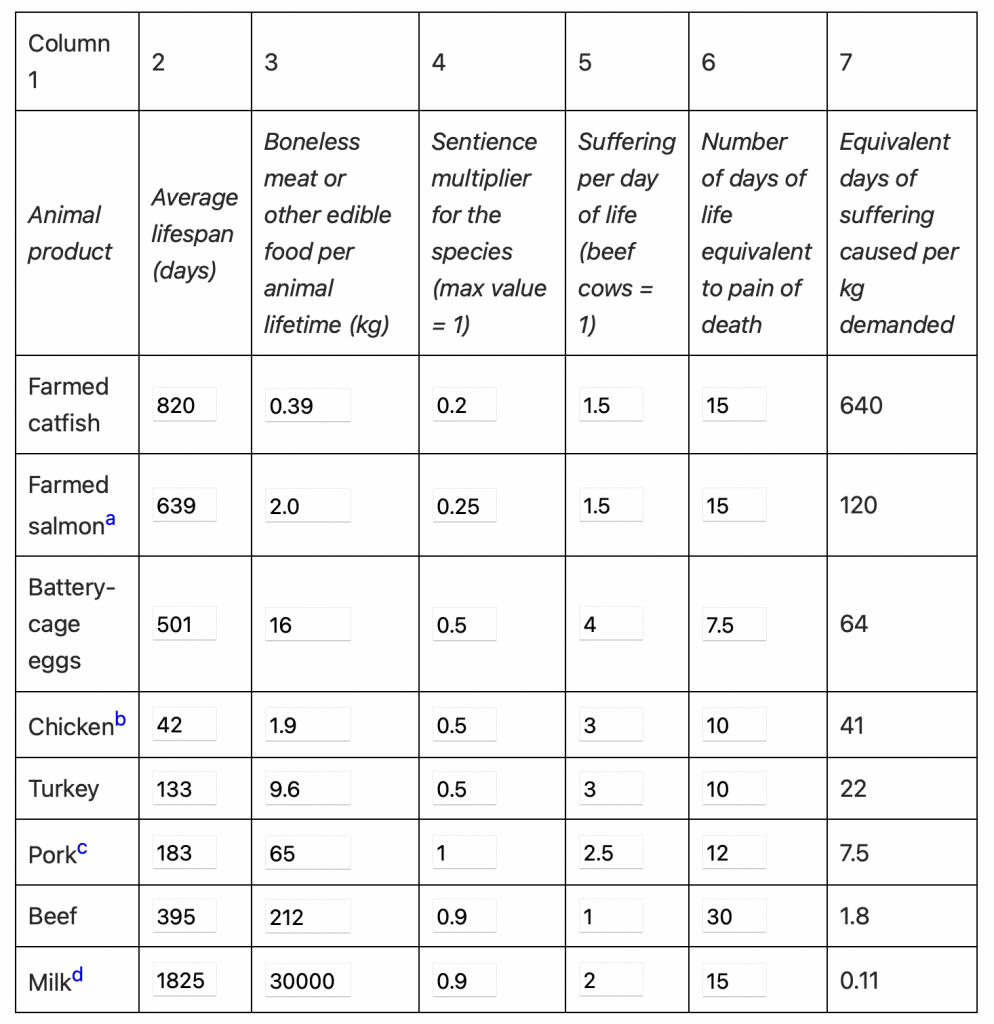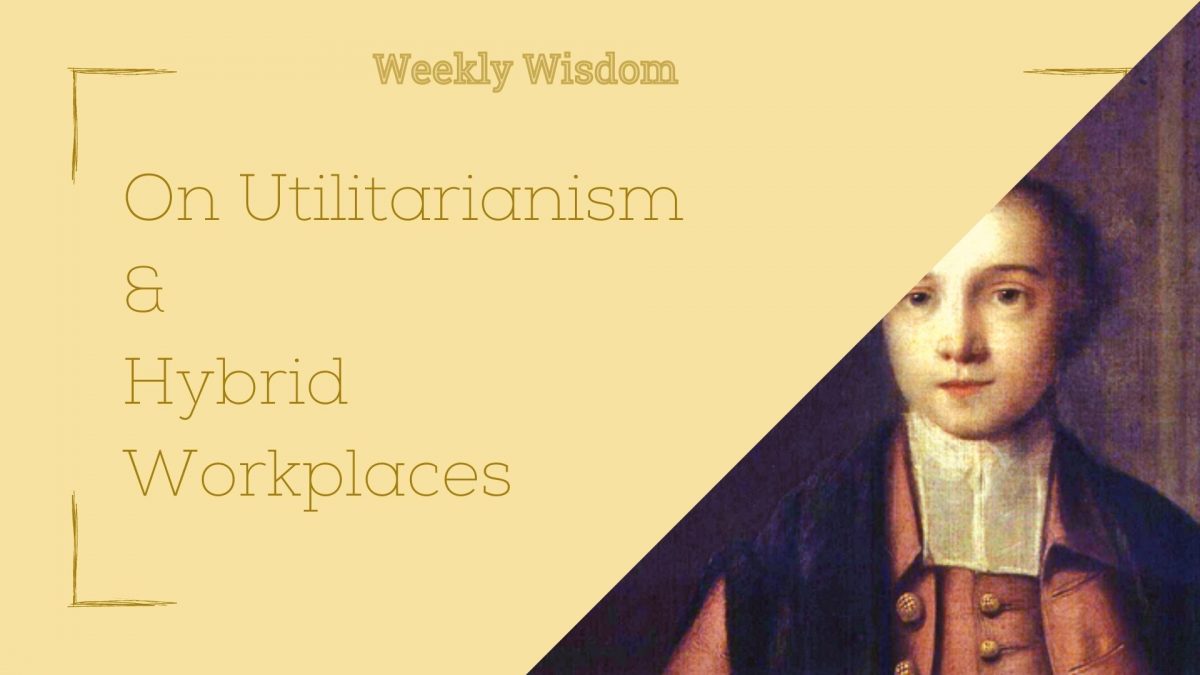Hello Subscribers, New and Old.
Welcome to Weekly Wisdom, your weekly dose of highlights, quotes and notes from my notebook. If you would like to receive this in your inbox, subscribe now.
If you want to support, do checkout the links in the Friends of Weekly Wisdom Section.
💡Something I learned
Why Utilitarianism is Abhorrent
Note: This is adapted from an email exchange I had with an another writer. He used to write about Effective Altruism a lot. It had me intrigued until he posted this chart in his newsletter. It describes the harm done consuming different animal products.

Effective altruism seems to be a politically correct way of saying Utilitarianism. Which I find abhorrent. The following is why.
Utilitarianism has some basic assumptions baked into it:
- All actions are measurable as good and harm.
- All metrics are of equal merit and are objective.
- Good and harm exist relative to each other. Doing or causing one will diminish the other.
- Our current understanding of good, and harm will not change. Regardless what new knowledge we uncover.
While these are gross abstractions and many adherents would protest some all or all of these categorizations, these are true in effect. All of these are incorrect assumptions. For Example, take the world’s safest driver. If they drive all their life not even getting into a single bump, we would never be able to measure the amount of good they produce. Suppose their safe driving also allows them protection from others’ reckless actions as well. The good they ‘produce’ would be infinite compared to an average driver. Yet still immeasurable.
Now suppose this safest driver is old and not as safe any more. They make a mistake and that results in the death of a family of four. Would all the good in the previous decades wipe away their grave error? I don’t believe so.
This explanation suffers all the same pitfalls that all parables do, but I do hope you get my point. Effective Altruism seems to be window dressing on the same idea, but with limited scope and a specific mission. However, I don’t say how a normal human person is supposed to compartmentalize these ideas only to charity. Eventually they would expand this to their whole world view. As in the chart that sparked this conversation.
Not consuming eggs would not offset the harm done by consuming milk, if you believe animal suffering is a grave concern. Even the measurement of ‘suffering’ is ridiculous. If you believe animals are individuals then how can you even aggregate suffering to an arbitrary number?
Utilitarianism is a way of dehumanizing morality. Which is why I find it abhorrent.
📕Something to read
- Your guide to doping foreign investors: What a difference three quarters make. This article is about one market(Pakistan) that was attracting a lot of VC money last year. However, it is a summary how irrational the easy money got.
- Apple, Privacy, and Tracking: Ben Thompson lays out a pretty clear case of why Apple’s third party tracking block has nothing to do with privacy. It’s an anti-competitive move to prop up it’s ad business.
Friends of Weekly Wisdom
- Refind: The essence of the web, every morning in your inbox. Tens of thousands of busy people start their day with their personalized digest by Refind. Sign up for free and pick your favorite topics and thought leaders. https://refind.com/?utm_source=newsletter&utm_medium=barter&utm_campaign=FU-SmtfFzzhQJDgFEz5eiw
- The Sample: The Sample lets you try the best newsletters based on your interest. With one-click you can subscribe if you like.
🗣Some Quotes and Notes
The roots of your consternation…
…are your desires. The more you desire, less you will be satiated if those your desires are fulfilled. American Founder Ben Franklin talking about a way to build material wealth. However, it is just as applicable to mental health.
It is easier to suppress the first desire than to satisfy all that follow it.
— Benjamin Franklin, The Way of Wealth
Middle Men
It is amusing to revisit this essay from a year ago. Pretty much every business is demanding a hybrid setup.
The other part of this issue is that promotions and career advancement have been tied, on some level, to years of service, rewarding people who are good at not getting fired rather than good at their jobs. We have tied the vague idea of management so tightly to career advancement that we simply make people managers as a rite of passage – we think that because they’re good at their job they can either make people good at their jobs or watch people be good at their jobs and make them do them more. This is a dysfunctional view of work on three levels:
Management is not being good the same thing as being at your job. We incentivize management as a control mechanism rather than a motivational and organizational mechanism in an organization, meaning that most middle managers are glorified cops. Middle managers are often graded on the work of their team, which means that they are actively incentivized to steal work and do little of their own.
— Ed Zitron, The Work-From-Home Future Is Destroying Bosses’ Brains
Bursting Bubbles
Another great one to revisit. The piece talks about the venture subsidized lifestyles that many millennials enjoyed over the last decade. How it was a bubble and it was going to burst.
The open secret is that this entire economy is a mirage. Hundreds of millions of dollars flow from private equity firms to sleek startups that subsidize their customers’ consumption habits through an endless cycle of debt and investment. Sooner or later, though, the bubble will burst. Whether it will shatter any of our illusions about the ease and accessibility of the good life remains to be seen.
— Gabby Del Valle, Luxury on the Installment Plan
Thank you for joining me this week. If you know some who might enjoy this, please forward this email to them. See you next week.
Mudassir Chapra

